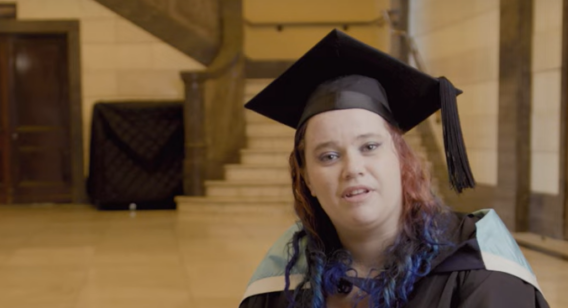

Bachelor of Psychological Science and Counselling
Bachelor of Psychological Science and Counselling
Gain the insight to create meaningful connection
+ You are expected to participate in live online tutorial sessions and attend a 2-day workshop for each counselling unit each trimester of study.

Overview
You care about the wellbeing of those around you and want to make a positive contribution to people’s lives. One in four Australians will meet the criteria for mental illness in a 12-month period, making this career path extremely important to the community (National Survey of Mental Health).
Our Bachelor of Psychological Science and Counselling gives you deep insight into why we think and act the way we do, what impact society has on our actions, and how to empower people to act differently. Included in this course is industry placement and counselling client contact, giving you the hands-on experience ACAP is known for.
This course is accredited by the Psychotherapy and Counselling Federation of Australia (PACFA). It is also accredited by ACAP under its self-accrediting authority.
*This course is not available to international students on campus in Perth, Brisbane or Adelaide.

What you'll learn
EXPLORE WITH AN APPLIED FOCUS:
-
Evidence-based approaches & Research methodology
-
Professional issues and applications
-
Biology, learning and cognition
-
The individual, society and culture
-
Learning and memory
-
Lifespan development
-
Social psychology & Psychopathology
-
Psychological measurement and assessment
-
Intercultural diversity and Indigenous psychology
-
Personality and individual differences (elective)
-
Behavioural neuroscience (elective)
-
Psychology of sex and intimate relationships (elective)
Course structure
The Bachelor of Psychological Science and Counselling course is comprised of 24 units, which are level 100, 200 and 300 units. To find out unit delivery information view the relevant Yearly Planner.
The course duration is 3 years full time or up to 8 years part time. For more information on the recommended course sequence click here.
Level: 100 level core
Credit points: 6
Mode of delivery: On-campus and online
Pre-requisites: None
Unit Description
This is the first of three inquiry-driven, multidisciplinary units in our undergraduate courses, which build upon one another to introduce key academic skills and an understanding of critical concepts relevant to the professions and careers into which our graduates progress. It will introduce you to higher education study, including key knowledge about the nature of higher education and how to navigate it successfully. It will help you develop critical thinking and communication skills, including reading and evaluating sources of information, summarising them effectively, and communicating your understanding to others. We will examine interactions between our own and others’ personal cultural identities, how they shape our experience of relationships personally and professionally, and their implications for future study and career. Finally, it will ensure that you understand the concept of cultural safety both as it applies to higher education and the workplace. The unit lays the groundwork for all of your future studies and will help you understand both yourself and others better.
Learning outcomes:
On successful completion of this unit, students will be able to:
a. Identify, summarise and communicate concepts from credible sources of information
b. Explain the role of culture, cultural identity and cultural influence in higher education and professional practice
c. Evaluate and apply theories and evidence related to culturally safe practices in professional practice
Unit workload:
The workload for this unit is 10 hours per week.
Textbook
The required text book for this unit can be found by viewing the textbook list by selecting the course and trimester at the following link: https://www.acap.edu.au/student-resources/student-central-your-studies/textbooks-and-course-materials/
Academic misconduct
Ethical conduct and academic integrity and honesty are fundamental to the mission of ACAP. Academic misconduct will not be tolerated by the college. Please refer to the Academic Misconduct Policy for full details.
Disclaimer
Unit information may be subject to change prior to the teaching trimester commencing. Once term has commenced please review the Unit Outline in your class space to ensure your trimester study plan is correct.
Level: 100 level core / elective
Credit points: 6
Pre-requisites: None
Unit Description:
This unit introduces students to the principles and effective processes for developing personal and professional self-awareness in counselling. Students engage in an analysis of the characteristics of self and influences on effective counselling processes and practices. Students appraise practices, processes and systemic barriers that have the potential to influence personal and professional growth and development in the counselling profession. Students develop a knowledge base to assist them plan for sustainable mental health and wellness in the counselling profession.
Learning Outcomes:
On completion of this unit students should be able to:
a. Outline the principles and effective processes for developing personal and professional self-awareness in counselling
b. Analyse the characteristics of self and influences on effective counselling processes and practices
c. Appraise practices, processes and systemic barriers on personal and professional development in the counselling profession
d. Plan for sustainable mental health and wellness in the counselling profession
Learning and Teaching Process:
The workload for this unit is 10 hours per week.
Level: 100 level core
Credit Points: 6
Pre-requisites: None
Mode of delivery: On-campus and online
Unit description:
This unit is one of two introductory units in psychology for commencing students. Along with PSYC1052 Foundational Psychological Processes and the three interdisciplinary units (MULT1015 Applications in Context, MULT1025 Professions and Society, and MULT1035 Sustainability in Helping Professionals) this unit builds foundational knowledge relevant to the history, philosophy, and methods underpinning the scientific study of psychology. In this unit, the history and philosophy of both the quantitative and qualitative approaches are presented within the broader historical and philosophical themes of psychology as a discipline. The goals of this unit are to set the foundation for understanding research design and methods in psychology and to develop skills relevant to critiquing research, which involves developing knowledge and skills in research thinking, research doing, and research consuming. The unit considers the application of these research methods within the context of important concepts such as the scientist-practitioner model, evidence-based practice, ontology and epistemology, and ethics. Content related to introductory concepts in the history of philosophy of psychology are also covered, along with content on the application of psychology in current professional and social contexts. This material will be presented in a manner that is scientifically rigorous yet culturally responsive and informs a broader discussion of psychology as both a professional practice in Australia and as an agent of social benefit. This unit is the first in a scaffolded series of units that, taken together, will facilitate the development of a comprehensive understanding of the skills and knowledge associated with research methods in psychology, the history and philosophy of psychology, and their contribution to the application of psychology.
Learning Outcomes:
On successful completion of this unit, students will be able to:
Learning and Teaching Process:
This unit is taught over 13 weeks. Students will participate in teaching and learning activities including:
a. Twelve (12) weekly pre-recorded 120 minute lectures
b. Twelve (12) weekly 90-minute live tutorials
For live tutorials, students will be enrolled to attend a regular class either a) on campus or b) online via Zoom.
In addition, the Unit Coordinator will be available for live online consultation for an hour on a weekly basis.
Level: 100 level core
Credit points: 6
Pre-requisites: MULT1015 Applications in Context
Mode of delivery: On-campus and online
Unit Description:
Opening up possibilities for developing multidisciplinary knowledge and practice, ACAP draws on the four disciplines in the college to develop three integrative units that are core to first-year undergraduate courses and a postgraduate course. These inquiry-driven units lay the groundwork for engaging students with multidisciplinary thinking, discourse and initiative in their fields of endeavour and in their future profession.
This unit introduces the student to academic skills and reflective writing practices. The unit develops the student’s understanding of ethical practice across multiple disciplines. The human rights framework in Australia and its relation to ethics and ethical behaviour in professional practice is also explored.
Learning outcomes:
On successful completion of this unit, students will be able to:
a. Demonstrate effective information literacy skills when identifying and assessing the credibility of sources
b. Demonstrate reflective thinking skills in constructing arguments about ethics in contemporary society and their value in their chosen profession
c. Describe, explain and reflect on the key parts of relevant professional codes of conduct and ethics and their role in professional life
d. Identify ethical dilemmas and apply ethical frameworks to guide practical decision making
e. Demonstrate a capacity for self-awareness and emerging reflective practices in personal and professional development
Unit workload:
The workload for this unit is 10 hours per week.
Level: 100 level core / elective
Credit points: 6
Pre-requisites: COUN1211 Professional Reflection and Self-Care, COUN1221 Mental Health and Wellness
Co-requisites: COUN1251 Counselling Theory
Unit Description:
In this unit, students develop an understanding of the historical development of the counselling profession and an applied understanding of counselling skills. Student learning is facilitated using relevant readings, extensive section notes in the unit curriculum, learning activities, skills practice and self-reflection. Students’ self-awareness of the influence of their values, attitudes and biases is fundamental in the development of effective counselling skills.
The process of assessment and establishing the counselling relationship is introduced in this unit. The counselling relationship is an important means of facilitating change and growth. Understanding of the stages of counselling provides a framework for practicing new skills. Students will learn how they can assist clients to achieve positive outcomes and increase their self-understanding.
Foundational counselling skills are introduced in this unit. There will be opportunity for learning through watching counselling demonstrations on YouTube and video resources available on the library website. Learning activities provide opportunity for practice with peers in triad groups. This is a very important part of developing counselling skills.
Learning Outcomes:
On completion of this unit students should be able to:
a. Describe ethical principles and processes for multicultural counselling and interviewing
b. Discuss counsellor receptiveness to the client’s unique worldview
c. Demonstrate foundational counselling and interviewing microskills to conduct a full session using only listening skills
d. Demonstrate self-awareness, openness to learn, and the receptivity to receive and implement feedback for microskill development
Learning and Teaching Process:
The workload for this unit is 10 hours per week.
Level: 100 level core
Credit Points: 6
Pre-requisites: None
Mode of delivery: On-campus and online
Unit description:
This unit is a level 100 core and along with the interdisciplinary level 100 units and PSYC1052 Psychology: History Science and Application 1 provides an initial introduction to psychology. This unit will introduce fundamental psychological processes including principles of human learning, personality, motivation and emotion. The unit will provide a foundation for future study in psychology, including an introduction to the key processes of human cognition, human emotion, and human behaviour. Students will engage with empirical research as a means of evaluating competing theories and learn to engage in critical analysis of research findings. Culturally responsive approaches to the study of psychology are emphasised with the development of skills in communication of psychological processes across diverse contexts. Students will acquire skills in critical thinking and research communication that are necessary to progress through advanced and applied studies in psychology.
Learning Outcomes:
On successful completion of this unit, students will be able to:
Learning and Teaching Process:
This unit is taught over 13 weeks and totals approximately 10 to 12 hours of learning activities per week.
Students will participate in teaching and learning activities including:
a. Twelve (12) weekly 120-minute interactive self-directed learning activities
b. Twelve (12) weekly 120-minute lectures
c. Twelve (12) weekly 90-minute tutorials
In addition, Coordinators are available for consultation for an hour on a weekly basis.
Level: 100 level core
Credit Points: 6
Pre-requisites: MULT1015 Applications in Context
Mode of delivery: On-campus and online
Unit description:
Opening up possibilities for developing multidisciplinary knowledge and practice, ACAP draws on the 4 Disciplines in the College to develop three integrative units that are core to first-year Undergraduate courses. These inquiry-driven units lay the groundwork for engaging students with multidisciplinary thinking, discourse and initiative in their fields of endeavour and in their future profession/vocation.
This unit will introduce students the issues of sustainability on a personal, professional and community level. We will examine individual and group practices that can meet the needs of current generations without compromising our or future generations ability to meet their own needs through a transdisciplinary perspective. This will encompass evidence-based approaches to promoting sustainability in the context of study, professional work and within our communities. The unit provides students with an opportunity to explore, analyse and reflect on the contribution of human behaviour to the sustainability of individuals and communities, and apply this to their personal, educational and future professional lives.
Please note: There are slightly different expectations in MULT1035 for Graduate Certificate of Psychological (GCPS) Science students. If you are enrolled in the Graduate Certificate of Psychology there are modified versions of Learning Outcome [c], the Assessment 1b rubric, and the Assessment 2 rubric in the relevant sections below. If you are not enrolled in the Graduate Certificate of Psychological Science, you can ignore these sections.
Learning outcomes:
On successful completion of this unit, students will be able to:
a. Define sustainability in personal, professional and community contexts (undergraduate)
b. Apply the principles of sustainability to personal, professional and community contexts (undergraduate)
c. Demonstrate how evidenced-based approaches can be used to take action to support sustainability (undergraduate)
Unit workload
The workload for this unit is 10 hours per week.
Level: 100 level core / elective
Credit points: 6
Pre-requisites: COUN1211 Professional Reflection and Self-Care, COUN1221 Mental Health and Wellness
Co-Requisites: COUN1231 Counselling Skills Training 1
Unit Description:
This unit introduces students to foundational theories of counselling practice. Students develop their knowledge and understanding of counselling as they differentiate, describe and apply counselling theories within specific contexts for diverse client presentations. Students begin working these theories into their own personal theory of counselling as they critically reflect on theories of choice and divergence from their own frames of reference.
Learning Outcomes:
On completion of this unit students should be able to:
a. Describe the purpose of theories in the counselling and career counselling process
b. Apply counselling theories for diverse client presentations
c. Articulate the differentiations between counselling theories
d. Critically reflect on counsellor theories of choice and divergence from own theoretical frames of reference
Learning and Teaching Process:
The workload for this unit is 10 hours per week.
Level: 200 level core
Credit Points: 6
Pre-requisites: PSYC1042 Psychology: History, Science and Application 1
Mode of delivery: On-campus and online
Unit description:
This unit is one of the four core second year units in all Psychology degrees. The unit builds upon foundational level knowledge of the history and philosophy underpinning the scientific study of psychology introduced in PSYC1042 Psychology: History, Science and Application 1. The unit also complements other units at this level that explore core perspectives that inform contemporary psychology (e.g., PSYC2112 Foundational Perspectives: Cognition, PSYC2122 Foundational Perspectives: Biological Bases, and PSYC2132 Foundational Perspectives: Lifespan Development) and includes a focus on the application of psychology to everyday lives. This unit is the second in a scaffolded series of units that, taken together, will facilitate the development of a comprehensive understanding of the skills and knowledge associated with research methods in psychology, the history and philosophy of psychology, and their contribution to the application of psychology.
In this unit, the history and philosophy of both the quantitative and qualitative approaches is presented within the broader historical and philosophical themes of psychology as a discipline. The goals of the unit are to develop an understanding of the role of quantitative data analysis and statistical testing (using the SPSS data analysis package) and qualitative approaches in answering research questions in psychology, which involves developing knowledge and skills in research thinking, research doing, and research consuming. The unit considers the application of these research methods within the context of important concepts, such as the scientist-practitioner model, evidence-based practice, ontology and epistemology, and ethics. This material will be presented in a manner that is scientifically rigorous, yet culturally responsive, and informs a broader discussion of psychology as both a professional practice in Australia and as an agent of social benefit.
Learning Outcomes:
On successful completion of this unit, students will be able to:
Learning and Teaching Process:
This unit is taught over 13 weeks and totals approximately 10 to 12 hours of learning activities per week. Students will participate in teaching and learning activities including:
a. Twelve (12) weekly 90 minute tutorials
b. Twelve (12) weekly online 120 minute asynchronous lectures
c. Twelve (12) weekly online 120 minute post-tutorial learning activities
In addition, Coordinators are available for consultation for an hour on a weekly basis.
Level: 200 level core
Credit Points: 6
Pre-requisites: PSYC2102 Psychology: History, Science and Application 2
Mode of delivery: On-campus and online
Unit description:
This unit is one of the core Level 200 units in the Bachelor of Psychological Science, Bachelor of Psychological Science and Counselling and Bachelor of Psychological Science and Criminology course. This unit will introduce students to theory and research in cognitive psychology. An emphasis of this unit is on the application of cognitive psychology to everyday life across the lifespan. Topics include learning and memory, academic performance, eyewitness testimony, neuropsychological disorders, resilience and wellbeing. We will also consider the origins of knowledge and consider Indigenous knowledges and their value in contributing to processes of learning, individual and community wellbeing, resilience and cultural safety.
Learning Outcomes:
On successful completion of this unit, students will be able to:
Learning and Teaching Process
This unit is taught over 13 weeks and totals approximately 10 to 12 hours of learning activities per week.
Students will participate in teaching and learning activities including:
a. Twelve (12) weekly online 120 minute pre-tutorial learning activities
b. Twelve (12) weekly 90 minute tutorials
c. Twelve (12) weekly online 120 minute post-tutorial learning activities
In addition, Coordinators are available for consultation for an hour on a weekly basis.
Level: 200 level core / elective
Credit points: 6
Pre-requisites: All level 100 units, COUN2211 Counselling and Neuroscience
Unit Description:
Building upon the basic microskills of counselling taught in the Counselling Skills Training 1 Unit, students will develop knowledge and skills to a positive wellness orientation into counselling practice. Building on the basic listening sequence, students practice and demonstrate focusing and empathetic confrontation skills, reflection of meaning and reframing. Responding to cultural diversity in counselling practice, students develop an awareness of the purpose and range of psychoeducation in counselling. Reflecting on professional identity, students conduct a self-audit of their counselling skills, including identifying strengths and areas for future professional development.
Learning Outcomes:
On successful completion of this unit, students will be able to:
a. Outline humanistic-existential and technical components of counsellors in the developmental / wellness approach to counselling practice
b. Critically appraise of the three-stage problem management process framework
c. Demonstrate the application of microskills in creating opportunities for establishing counselling objectives and for problem resolution
d. Conduct a self-audit of humanistic – existential and microskills approach to create movement for clients of diverse backgrounds
Learning and Teaching Process:
The workload for this unit is 10 hours per week.
Level: 200 level core / elective
Credit points: 6
Pre-requisites: All level 100 units
Unit Description:
This unit further progresses student counsellors’ critical analysis of theories and models of trauma informed counselling for clients of diverse backgrounds. Students examine the application of trauma informed care to distinct types of trauma. They learn how to recognise and assess a range of trauma symptoms and triggers; and explore available assessments according to professional level qualifications. Within the ethical and legal framework of trauma informed practice, skills and intervention techniques are scrutinised.
Learning Outcomes:
On successful completion of this unit, students will be able to:
a. Critically reflect on ethical and legal issue in trauma informed practice
b. Recognise and assess a range of trauma symptoms and triggers
c. Critically analyse theories and models of trauma informed counselling for clients of diverse backgrounds
d. Evaluate trauma informed interventions techniques for usefulness and effectiveness
Learning and Teaching Process:
The workload for this unit is 10 hours per week.
Level: 200 level core
Credit Points: 6
Pre-requisites: PSYC2102 Psychology: History, Science and Application 2
Mode of delivery: On-campus and online
Unit description:
This unit is a core subject in the 2nd year of the Bachelor of Psychological Science, Bachelor of Psychological Science and Counselling, and Bachelor of Psychological Science and Criminology programs. This unit will introduce students to the biological bases that contribute to our understanding of human behaviour. It will provide an in-depth understanding of the anatomical, biochemical, genetic and physiological bases of brain function and dysfunction, current neuroscientific approaches to brain function and behaviour, including detailed knowledge of the processes of perception by the senses. This foundational knowledge will then be applied to current understandings of neuropsychological disorders.
Learning Outcomes:
On successful completion of this unit, students will be able to:
Learning and Teaching Process:
This unit is taught over 13 weeks and totals approximately 10 to 12 hours of learning activities per week.
Students will participate in teaching and learning activities including:
a. Twelve (12) weekly online 120 minute pre-tutorial learning activities
b. Twelve (12) weekly 90 minute tutorials
c. Twelve (12) weekly online 120 minute post-tutorial learning activities
In addition, Coordinators are available for consultation for an hour on a weekly basis.
Level: 200 level core / elective
Credit points: 6
Pre-requisites: All level 100 units
Unit Description:
This unit introduces student counsellors to ethical and professional processes and practices of grief and loss counselling with diverse individuals. Students critique contemporary approaches to grief and loss, grief and loss theories and models in counselling. Skilled application of grief and loss counselling interventions are matched to a range of client presentations across the lifespan. Counsellor self-care is considered for student counsellors working with varying experiences and expressions of grief and loss.
Learning Outcomes:
On successful completion of this unit, students will be able to:
a. Critically evaluate theories, models and contemporary approaches of grief and loss counselling
b. Skilfully apply grief and loss counselling interventions, matched to client presentations
c. Identify ethical and professional aspects of grief and loss counselling practice for individuals of diverse backgrounds
d. Explain varying experiences and expressions of grief and mourning and the influence of personal, family, social and cultural contexts
Learning and Teaching Process:
The workload for this unit is 10 hours per week.
Level: 200 level core / elective
Credit points: 6
Pre-requisites: All Level 100 units
Unit Description:
This unit introduces student counsellors to contemporary applications of group work. Students will learn the function of key elements of group structure, process and dynamics as well as adult learning principles, communication skills and group work techniques for systematic group facilitation. Students will use case studies to analyse group dynamics, probable causes of dysfunction, stages of a group’s development, group member functions, power dynamics and leader interventions and their outcomes. Students will consider the purposes, missions and formats of group work in light of ethical codes of engagement. Self-reflection and evaluation processes are incorporated to foster effective professional development for student counsellors.
Learning Outcomes:
On successful completion of this unit, students will be able to:
a. Apply group theory to working with groups in counselling
b. Critically appraise the complexities of ethical and professional issues in group counselling
c. Demonstrate and analyse the stages of group structure and process in group counselling
d. Provide an overview of diversity issues in group counselling practice
Learning and Teaching Process:
The workload for this unit is 10 hours per week.
Level: 200 level core
Credit Points: 6
Pre-requisites: PSYC2102 Psychology: History, Science and Application 2
Mode of delivery: On-campus and online
Unit description:
This unit is one of the core Level 200 units in the undergraduate psychology course. This unit will introduce theory and research related to major themes of psychological development across the lifespan. The aim of the unit is to provide a solid understanding of issues and methods used in the psychological study of human development across the lifespan. Topics covered in the unit include: theoretical perspectives on lifespan development; physical and biological development; the development of cognition, intelligence, and language; social, emotional, and moral development; contexts for development; love and intimacy; gender and sexuality; and ageing, death, dying, and bereavement.
In this unit, students will develop the capacity to view key psychological processes from a lifespan perspective, adding to the breadth of knowledge of psychology provided by other Level 1 units, laying the foundation for further studies in developmental and professional psychology. The unit will emphasise skills required to comprehend and critically analyse psychological research in a manner that is scientifically rigorous yet culturally responsive. Further development of effective written communication skills in this unit will also provide framework for application of these skills across diverse groups in later professional contexts. The unit also emphasises understanding and demonstration of key elements of public safety including informed consent, equity and inclusion, and social sustainability. Students will have the opportunity to practice reflexivity through applying knowledge obtained in this unit to themselves and wider real-world contexts, providing foundational skills towards further professional development and practice in a culturally safe manner, to maintain personal and professional resilience across the lifetime.
Learning Outcomes:
On successful completion of this unit, students will be able to:
Learning and Teaching Process:
This unit is taught over 13 weeks and totals approximately 10 to 12 hours of learning activities per week.
Students will participate in teaching and learning activities including:
a. Twelve (12) weekly online 120 minute pre-tutorial learning activities
b. Twelve (12) weekly 90 minute tutorials
c. Twelve (12) weekly online 120 minute post-tutorial learning activities
In addition, Coordinators are available for consultation for an hour on a weekly basis.
Level: 300 level core / elective
Credit points: 6
Pre-requisites: All level 100 units, all level 200 units
Unit Description:
This unit assures student counsellors interrogation of contemporary counselling paradigms and research. Students identify and deliberate on ethical and professional issues in applying contemporary counselling approaches in practice. The evidence base and theoretically philosophy of contemporary counselling orientations is critically evaluated. Students critical reflect on developing competencies with the effective enactment of contemporary counselling approaches with clients of diverse backgrounds.
Learning Outcomes:
On successful completion of this unit, students will be able to:
a. Interrogate contemporary counselling paradigms and research
b. Critically evaluate the evidence base of contemporary counselling orientations
c. Identify ethical and professional issues in applying contemporary counselling approaches in practice
e. Critically reflect on skills and knowledge required for contemporary counselling approaches
Learning and Teaching Process:
The workload for this unit is 10 hours per week.
Level: 300 level core / elective
Credit points: 6
Pre-requisites: All level 100 units, all level 200 units
Unit Description:
This unit assures student counsellors’ critical appraisal of culture and context underpinning counselling practice. Students further build their counselling skill repertoire, developing and practicing counselling skills and techniques appropriate for diverse clients presenting with complex and challenging issues. Striving to adapt counselling theories to the diverse client context, students conduct a self-audit, with integrating counselling theories, counselling skills and techniques across specific contexts in creating client movement toward agreed-upon objectives and problem – and opportunities – resolution. Throughout this process, students deepen their knowledge, understanding and skills with the interpersonal process approach to counselling.
Learning Outcomes:
On successful completion of this unit, students will be able to:
a. Critically analyse culture and context through the case conceptualisation process
b. Demonstrate and analyse counselling skills and techniques applicable to diverse client cultural contexts
c. Conduct a self-audit, integrating counselling theories, skills and techniques across specific contexts in helping to create movement for clients of diverse backgrounds
d. Critically appraise the interpersonal process approach in counselling practice
Learning and Teaching Process:
The workload for this unit is 10 hours per week.
Level: 300 level core
Credit Points: 6
Pre-requisites: PSYC2102 Psychology: History, Science and Application 2
Mode of delivery: On-campus and online
Unit Description:
This unit is one of the four core level 300 units in Psychology. The unit builds upon foundational level knowledge of the history and philosophy underpinning the scientific study of psychology as was introduced in PSYC1042 and PSY2102. This unit also complements other units at this level where there is a significant and advanced focus on the application of psychology in other core units (e.g., PSYC3112, PSYC3132) and electives. In this unit, the history and philosophy of both the quantitative and qualitative approaches is presented within the broader historical and philosophical themes of psychology as a discipline. The goals of the unit are to further student’s knowledge and skills in research methods used in psychological research and the application of this research, with a specific emphasis on qualitative research and advanced statistics (e.g., ANOVA and Regression). The unit considers the application of these research methods within the context of important concepts, such as the scientist-practitioner model, evidence-based practice, ontology and epistemology and ethics. This material will be presented in a manner that is scientifically rigorous yet culturally responsive and informs a broader discussion of psychology as both a professional practice in Australia and as an agent of social benefit. This unit is the third, and final unit, in a scaffolded series of units that, taken together, will facilitate the development of a comprehensive understanding of the skills and knowledge associated with research methods in psychology, the history and philosophy of psychology, and their contribution to the application of psychology.
Learning Outcomes:
On successful completion of this unit, students will be able to:
Learning and Teaching Process:
This unit is taught over 13 weeks and totals approximately 10 to 12 hours of learning activities per week. Students will participate in teaching and learning activities including:
a. Twelve (12) weekly 90 minute tutorials
b. Twelve (12) weekly online 120 minute pre-tutorial learning activities
c. Twelve (12) weekly online 120 minute post-tutorial learning activities
In addition, Coordinators are available for consultation for an hour on a weekly basis.
Level: 300 level core
Credit Points: 6
Pre-requisites: PSYC3102 Psychology: History, Science and Application 3
Mode of delivery: On-campus and online
Unit Description:
This unit is a level 300 core unit in fulfilment of the Bachelor of Psychological Science, Bachelor of Psychological Science and Counselling and the Bachelor of Psychological Science and Criminology.
This unit will introduce key concepts pertaining to individual differences and assessment. It will provide students with an understanding of the psychological characteristics that distinguish and define individuals and how to use assessment of psychological characteristics appropriately. More specifically, this unit will introduce and discuss intelligence, personality, aptitude and values. This unit further examines key concepts of psychological assessment and its psychometric properties and assessing in different settings. Beginning with the history and development of psychological assessment and test theory, the unit will further examine theoretical and methodological issues in the measurement of intelligence, cognition, psychosocial functioning, adaptive behaviour, attitudes, and values. This unit further looks at norms and bias and its link to cultural sensitivity in the use of psychological assessment. Tests of special abilities are also considered, along with measures developed for different settings. Through practical work, students will develop an understanding of the way in which psychologists use the outcomes of psychological assessments.
Learning Outcomes:
On successful completion of this unit, students will be able to:
Learning and Teaching Process:
This unit is taught over 13 weeks and totals approximately 10 to 12 hours of learning activities per week.
Students will participate in teaching and learning activities including:
a. Twelve (12) weekly online 120 minute pre-tutorial learning activities
b. Twelve (12) weekly 90 minute tutorials
c. Twelve (12) weekly online 120 minute post-tutorial learning activities
In addition, Coordinators are available for consultation for an hour on a weekly basis.
Level: 300 level core unit
Credit Points: 6
Pre-requisites: PSYC3102 Psychology: History, Science and Application 3
Mode of delivery: On-campus and online
Unit Description:
This unit is one of the core Level 300 units in the undergraduate psychology course. This unit will extend students understanding of psychological processes provided by other level 2 and 3 units by introducing theory and research related to abnormal psychology and interventions for mental health disorders. The aim of the unit is to introduce students to how behaviour is categorised as abnormal and to examine how mental health problems are diagnosed and managed across the lifespan. The unit explores cultural perspectives, history, classification, causes and treatment of psychological disorders. Students will critically examine the contribution of psychological, biological, and socio-cultural factors to the expression of psychopathology. Students will explore how psychological problems are defined and understood by other mental health professions and will learn skills on how to communicate and work with other health professionals. Ethical and legal issues relevant to the provision of mental health services and how professional psychological practice can inform the health sector and increase public safety will also be explored and critically analysed.
Learning Outcomes:
On successful completion of this unit, students will be able to:
Learning and Teaching Process:
This unit is taught over 13 weeks and totals approximately 10 to 12 hours of learning activities per week.
Students will participate in teaching and learning activities including:
a. Twelve (12) weekly online 120 minute pre-tutorial learning activities
b. Twelve (12) weekly 90-minute live tutorials
c. Twelve (12) weekly online 120 minute post-tutorial learning activities
For live tutorials, students will be enrolled to attend a regular class either a) on campus or b) online via Zoom.
In addition, Coordinators are available for consultation for an hour on a weekly basis.
Level: 300 level core
Credit points: 6
Prerequisites:
Bachelor of Counselling students:
- All Level 100 and 200 units
- COUN3211 Contemporary Counselling Orientations and Research
- COUN3231 Counselling Skills Training 3
- COUN3251 Counselling Children and Youth
Bachelor of Psychological Science and Counselling students:
- All Level 100 and 200 multidisciplinary and counselling core units
- COUN3211 Contemporary Counselling Orientations and Research
- COUN3231 Counselling Skills Training 3
Bachelor of Counselling (Coaching) students:
- All Level 100 Multidisciplinary and Counselling Core Units
- Level 200 Counselling Core Units
- COUN3211 Contemporary Counselling Orientations and Research
Unit Description:
This unit is designed to meet the accreditation requirements of the Australian Counselling Association (ACA) and the Psychotherapy and Counselling Federation of Australia (PACFA). Field base placement units support the student counsellor to develop the skills essential for ethical counselling practice. It is when learning across the three years of the Bachelor of Counselling degree comes together in real counselling contexts.
In preparation for placement, students attend a 16 Hour Online pre-placement Workshop available before the start of Placement. This workshop is delivered by online webinar.
The ACAP small group clinical supervision component of this unit provides student counsellors the opportunity to critically reflect on their counselling practice to facilitate and consolidate skill development and refine counsellor professional identity. Students appraise and exercise ethical thinking and ethical decision-making in counselling practice and in group supervision. They analyse complex client presentations, practice case conceptualisation and case formulation, apply counselling theories, skills and interventions to practice with diverse clients in placement agencies. Students engage in ongoing critical reflection on issues relevant to their placement and the focus / content of clinical supervision.
Learning Outcomes:
On successful completion of this unit, students will be able to:
a. Demonstrate effective engagement in group supervision and placement, developing self-awareness and critical reflection through effective application of feedback
b. Apply theoretical knowledge and counselling skills to practice with clients in a counselling agency
c. Demonstrate ethical thinking and decision-making in counselling practice, with respect for the rights and autonomy of clients and therapeutic boundaries
d. Demonstrate competency in the application of counselling skills and interventions for diverse client cases in counselling practice and in supervision
Learning and Teaching Process:
The workload for this unit is 10 hours per week.
Level: 300 level core unit
Credit points: 6
Pre-requisites: PSYC3102 Psychology: History, Science and Application 3
Mode of delivery: On-campus and online
Unit description:
This unit is one of the core Level 300 units in the undergraduate psychology course. This unit will introduce theory and research related to major themes of social and community psychology. The aim of the unit is to provide a solid understanding of the theoretical underpinnings, empirical evidence, and applications of social and community psychology. Key theories and research methods in social psychology are examined across a broad spectrum of issues and topics. The unit explores the history and crises of social psychology, Indigenous psychology and culture, self-identity and knowledge, attributions and attitudes, social influence, prejudice, acculturation, aggressive and pro-social behaviour, and social justice. The unit has a focus on the applications of social and community psychology including the impact of culture on social behaviour.
In this unit, students will develop the capacity to view key psychological processes from a social and community psychology perspective, adding to the breadth of knowledge of psychology provided by other Level 200 and 300 units, laying the foundation for further studies in social and community psychology. The unit will emphasise skills required to comprehend and critically analyse psychological research in a manner that is scientifically rigorous, yet reflexive and culturally responsive. The development of oral communication, interpersonal and reflective skills in this unit will also provide a framework for the application of these skills across diverse groups in later professional contexts and help to prepare students for further study in psychology. The unit also emphasises understanding and demonstration of key elements of public safety including equity and inclusion, and social sustainability. Students will have the opportunity to practice reflexivity through a reflective assessment task, as well as applying knowledge obtained in this unit to themselves and wider real-world contexts, providing foundational skills towards further professional development and practice in a culturally safe manner, to maintain personal and professional resilience.
Learning Outcomes:
On successful completion of this unit, students will be able to:
Learning and Teaching Process:
This unit is taught over 13 weeks and totals approximately 10 to 12 hours of learning activities per week.
Students will participate in teaching and learning activities including:
a. Twelve (12) weekly online 120 minute pre-tutorial learning activities
b. Twelve (12) weekly 90-minute live tutorials
c. Twelve (12) weekly online 120 minute post-tutorial learning activities
For live tutorials, students will be enrolled to attend a regular class either a) on campus or b) online via Zoom.
In addition, Coordinators are available for consultation for an hour on a weekly basis.
Level: 300 level core
Credit points: 6
Prerequisites: COUN3311 Work Placement, Experience and Supervision 1
Unit Description:
This is the second work placement, experience and supervision unit. The purpose and learning objectives are the same as the Work Placement, Experience and Supervision 1 unit. This unit is designed to meet the accreditation requirements of the Australian Counselling Association (ACA) and the Psychotherapy and Counselling Federation of Australia (PACFA). Field base placement units support the student counsellor to develop the skills essential for ethical counselling practice. It is when learning across the three years of the Bachelor of Counselling degree comes together in real counselling contexts.
The ACAP small group clinical supervision component of this unit provides student counsellors the opportunity to critically reflect on their counselling practice to facilitate and consolidate skill development, and counsellor professional identity. Students appraise and exercise ethical thinking and ethical decision-making in counselling practice and in group supervision. They analyse complex client presentations, practice case conceptualisation and case formulation, apply counselling theories, skills and interventions to practice with diverse clients in placement agencies. Students engage in ongoing critically reflection on issues relevant to their placement and the focus / content of clinical supervision.
Learning Outcomes:
On successful completion of this unit, students will be able to:
a. Demonstrate professional engagement in group supervision and placement, practicing self-awareness and critical reflection through critical application of feedback
b. Critically apply theoretical knowledge and counselling skills to practice with clients in a counselling agency
c. Critically appraise and exercise ethical thinking and decision-making in counselling practice, with clients of diverse backgrounds
d. Apply counselling theory, skills and interventions for diverse client cases in counselling practice in supervision
Learning and Teaching Process:
The workload for this unit is 10 hours per week.
View unit descriptions


Pathways for future study
The Bachelor of Psychological Science and Counselling is specialised course gives you the skills to successfully explore a career in counselling and applied psychology. You are required to complete placement as part of your studies. Upon successful graduation you can practice as a professional counsellor.
It’s also the first three of six years training required if you want to work as a registered psychologist.

